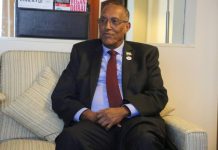 This article is written by Terje Vigtel, Former Director of Norwegian Volunteer Service, Ambassador to Zambia and Director of Norad’s Civil Society Department.
This article is written by Terje Vigtel, Former Director of Norwegian Volunteer Service, Ambassador to Zambia and Director of Norad’s Civil Society Department.
I am amazed by the enthusiasm people from Somaliland have about their country. They point to the territory`s growing economy and the development of a democratic political system that works better than many others on the continent. But most important of all, they are proud of a society that has gone a long way in the restoration and maintenance of peace.
I have also been in touch with people who are critical of the clan system that has been established. The critics also say foreigners easily get trapped by Somaliland`s propaganda and that Somaliland is nothing but an artificial state recognized by no-one. They fear that the model developed in Somaliland could result in a formation of several Somali states and a permanent disintegration of Somalia.
Somaliland is a breakaway region of Somalia that declared independence from the rest in 1991. The policy of the African Union is that countries must stick to the boundaries they were given at independence. Therefore Somaliland is still not recognized by the international community. But the territory has lobbied hard to win support for its claim to be a sovereign state.
It seems as if it is up to the African Union to decide what happens to Somaliland.
President Ahmed Silanyo feels strongly about the importance of international recognition: “If we are granted international recognition during my presidency, we would put on the biggest celebration the world has ever seen”.
Recently there has been an increased interest from the rest of the world in the development model worked out in Somaliland. International contact is increasing and some development organizations have initiated programmes in the country.
Some observers, however, also look upon the lack of foreign engagement in the building of modern Somaliland as an advantage. The local political process was allowed to proceed with all its time-consuming traditional consultations with little or no help from outside. Somaliland succeeded in building a system which was initially based on clan politics and respect for elders, but over time incorporated more modern political institutions.
By building on existing forms of governance instead of ignoring them, not relying upon external resources and agendas, but relying heavily upon remittances from its own people in exile, Somaliland is very different from the other Somalia.
Ali Mazrui says that Somaliland did succeed in gathering momentum as a case of “bottom up” nation building, rooted in culture and energized from within.
One key factor behind the success of Somaliland is all the people returning from the diaspora with their knowledge, experiences and resources. They helped to drive the economy and play an important role in politics. Mary Harper refer to them as the “Somaliland pioneers”.
It is my impression that the international community is prepared to recognize Somaliland if the African Union decided to change its policy.
There is no doubt that Somaliland has demonstrated to the world that it is a somali state that is much more than war, hunger, Islamist extremism and piracy. But poverty and unemployment are still widespread as in many other African countries.
Even with all its weaknesses, Somaliland is a most impressive example of progress and stability, and should be acknowledged for that.
























